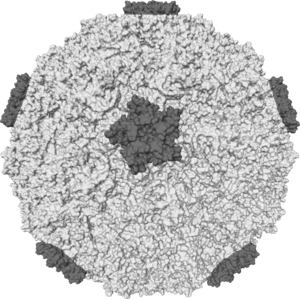The Common Cold
| Common cold | |
|---|---|
| Synonyms | Acute viral nasopharyngitis, nasopharyngitis, viral rhinitis, rhinopharyngitis, acute coryza, head cold |
 |
|
| A representation of the molecular surface of one variant of human rhinovirus. | |
| Specialty | Infectious disease |
| Symptoms | Cough, sore throat, runny nose, fever |
| Complications | Otitis media, sinusitis |
| Usual onset | ~2 days from exposure |
| Duration | 1–3 weeks |
| Causes | Viral |
| Similar conditions | Allergic rhinitis, pertussis, sinusitis |
| Prevention | Hand washing, face mask |
| Treatment | Symptomatic |
| Medication | NSAIDs |
| Frequency | 2–4 per year (adults); 6–8 per year (young children) |
| Classification | |
|---|---|
| External resources |
Common cold, also known simply as a cold, is a viral infectious disease of the upper respiratory tract that primarily affects the nose. The throat, sinuses, and voice box may also be affected. Signs and symptoms may begin less than two days following exposure. They include coughing, sore throat, runny nose, sneezing, headache, and fever. People usually recover in seven to ten days. Some symptoms may last up to three weeks. In those with other health problems, pneumonia may occasionally develop.
Well over 200 virus strains are implicated in the cause of the common cold; the rhinoviruses are the most common. They spread through the air during close contact with infected people and indirectly through contact with objects in the environment followed by transfer to the mouth or nose. Risk factors include going to daycare, not sleeping well, and psychological stress. Symptoms are mostly due to the body's immune response to the infection rather than to tissue destruction by the viruses themselves. People with influenza often show similar symptoms as people with a cold, though symptoms are usually more severe in the former. Influenza is less likely to result in a runny nose.
There is no vaccine for the common cold. The primary methods of prevention are hand washing; not touching the eyes, nose or mouth with unwashed hands; and staying away from other sick people. Some evidence supports the use of face masks. No cure for the common cold exists, but the symptoms can be treated.Nonsteroidal anti-inflammatory drugs (NSAIDs) such as ibuprofen may help with pain.Antibiotics should not be used. Evidence does not support a benefit from cough medicines.
...
Wikipedia
